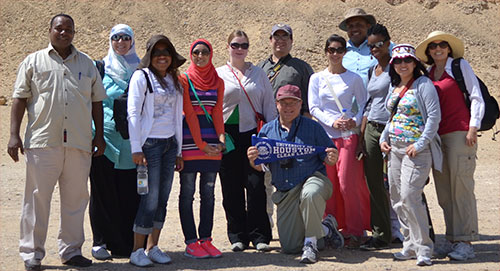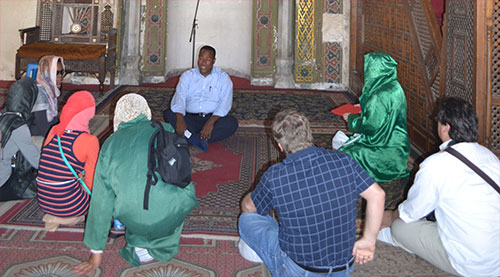
A trip abroad brings change to light

Stephen Schumacher
The Signal
In 2011 the world watched as Egypt transitioned from an oppression-filled region to one of a free and equal representation of its people.
A revolution started by few and spread by millions; brought together for a single goal – one often overlooked and taken for granted by the Western world – democracy.
When the dust settled, more than 800 lives would be lost, thousands would be injured, and one president would resign.
The resignation of Egyptian President Hosni Mubarak resulted in Egypt’s first free and open election. Everette Penn, associate professor of criminology, and Mike McMullen, associate professor of sociology and cross-cultural studies, witnessed firsthand Egypt’s first steps toward democracy during their annual study abroad program, Egypt in Transition.
Their stories paint a vivid picture of a time of triumph and great change.
“We were there between the initial election in May when there were 13 candidates, and then we left on the day the runoff elections started happening for the two candidates, the two top vote getters,” McMullen said.
The runoff election McMullen refers to was between Ahmed Shafik, the last Prime Minister under Hosni Mubarak, and Muslim Brotherhood candidate Mohamed Morsi.
Penn and McMullen were quick to point out that although the Egyptian people had much to celebrate, things were still far from perfect.
“During our study abroad trips we get the opportunity to talk to many Egyptians,” Penn said. “We have the opportunity to talk to people who are very into the mainstream, who are shop owners, tourists, academics. We would ask these questions of them and we would get just about every spectrum of answer you could think of.”
McMullen remembered the lingering tension people felt about the choices they were given for the presidency.
“What I noticed when I talked to people was their frustration that they went through all this revolution and it came down to the old regime candidate that many did not want,” McMullen recalled. “Then others were afraid of the Muslim brotherhood candidate. I think there was a mixture of hope and frustration. All this blood sweat and tears, and this is what they got. So there was frustration, but still excitement, because for the first time since the day of the pharaohs they were going to elect their own leader.”

“I think what we saw was an excitement in the idea of voting but not necessarily an excitement that great change would occur,” Penn added.
Despite the Egyptian peoples’ victory in overthrowing an oppressive regime, the election was shrouded by uncertainty. Feelings from years of oppression do not simply fade overnight.
“I think all of us assume the election here for the U.S. president is going to happen,” McMullen said. “It wouldn’t even enter my mind, ‘would the military stage a coup to prevent it?’ That was a real concern there. Even up until the day we flew out when the runoff election happened, there were still people wondering, ‘is the military going to allow this to happen?’”
The fear and confusion of wondering if the people would have a chance to vote, knowing that at any moment the military could step in and bring the entire process to a halt, the freedom to choose, without a fear for our safety or well-being, is something Americans don’t have to face today.
On the last day of their trip, Penn and McMullen walked the streets as the runoff elections took place. Penn recalls it as a powerful and emotional day.
“For me, the pinnacle moment of the trip was the Saturday before we left,” Penn said. “Dr. McMullen, a student, our guide and myself, we walked the neighborhood as the elections were taking place. And we walked by a polling station that had news reporters, people lined up, even a truck for water, and it truly brought a tear to my eye, because I paralleled the 1960s and the 1950s of African Americans here in the South and the work that had to be done, and the lives lost to get to that moment with the joy of seeing another group of people have the honor and the right to vote.”
As McMullen and Penn took in the sights and sounds of the historic runoff election, their own tour guide was pulled aside and interviewed by a reporter. McMullen was struck by the fact that a regular Egyptian citizen’s opinion was valued and sought after; he saw it as evidence of the significant change in Egypt’s transition toward democracy.
“It made me appreciate what we have here,” McMullen said. “I’m not worried about a coup. Romney may win, Obama may get re-elected, but there is not going to be a revolution. There will be a peaceful transition of power.”
“Isn’t that something – that on that day in January every four years, that it is a shaking of hands and an understanding that you now have power? That is remarkable,” Penn mused. “With the many countries I have traveled around the world, it is always great to come back to America and think, ‘that’s the way we do business.’”
Penn and McMullen both stressed the importance of focusing on the similarities instead of the differences that can separate cultures.
“People are the same no matter where they come from around the world,” Penn said. “People want the best for themselves, for their family, the respect from others, to be able to follow their own religion. You find out the more you travel, the more people are similar. We are more the same than we are different.”
